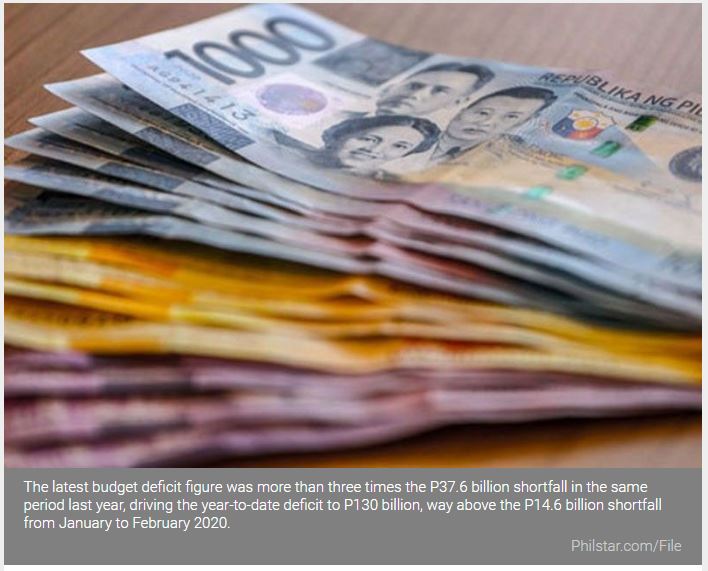Philippines: Budget gap swells to P116 billion in February
MANILA, Philippines — The government’s budget shortfall widened to P116 billion in February as pandemic response expenditures outpaced revenue collections by a wide margin, according to the Bureau of the Treasury (BTr).
The latest budget deficit figure was more than three times the P37.6 billion shortfall in the same period last year, driving the year-to-date deficit to P130 billion, way above the P14.6 billion shortfall from January to February 2020.
Revenue collections recovered by 6.5 percent year-on-year in February, but was met by a 37.27 percent year-on-year surge in expenditures meant to blunt the economic impact of the pandemic such as lending and credit guarantee programs.
Collections in February grew to P219.6 billion because of strong inflows of tax revenues, which accounted for 93 percent of collections.
This growth offset the 6.51 percent year-on-year drop in non-tax revenues to P16.3 billion in February.
Total revenues from January to February contracted by 4.22 percent year-on-year to P480.3 billion as collections have yet to fully recover as well as the timing of dividend remittances.
Collections by the Bureau of Internal Revenue (BIR), which grew by 8.39 percent year-on-year, reached P154.1 billion in February, bringing the two-month income to P336.3 billion.
Similarly, the Bureau of Customs (BOC) improved its performance in February as it managed a 5.35 percent year-on-year expansion with P47.2 billion for the month. However, year-to-date collection was still down by 6.17 percent to P94.5 billion.
Treasury income also fell by 22 percent to P4.6 billion in February because of lower collections from the Philippine Amusement and Gaming Corp. (Pagcor) and investment income.
Collections from January to February also declined by 32.19 percent to P23.2 billion.
February collections from other non-tax offices, including privatization proceeds and fees and charges, slightly increased by 1.37 percent year-on-year to P11.7 billion, but year-to-date collection of P21.1 billion remained lower than January to February 2020 collections.
Government expenditures, meanwhile, surged to P335 billion as both primary expenditures and interest payments increased for the month.
The bulk or 91 percent of the spending went to primary expenditures, comprising equity releases to state-run banks and provision of loan guarantees meant to support industries and sectors reeling from diminished economic activity.
Interest payments for the month almost doubled, mainly due to coupon payments for the retail treasury bonds issued in 2020 and the additional interest payments for the euro bonds issued in February last year.
The February performance drove year-to-date total disbursements to P610.3 billion, which reflects an 18.27 percent expansion compared to the same period in 2020.
The reimposition of stricter quarantine standards in Metro Manila and surrounding provinces creates conditions that could contribute to a wider deficit, said Michael Ricafort, chief economist of the Rizal Commercial Banking Corp.
As business activities slow down again, tax take by the government will be reduced anew. More government spending and borrowings to finance social assistance will also lead to higher outstanding debt.
“Every week of ECQ in NCR+ would require at least P20 billion in additional financial assistance or social amelioration funds, thereby adding to the budget deficit, government borrowings, and overall debt nonetheless,” he said in a research note yesterday.
Source: https://www.philstar.com/business/2021/03/31/2088126/budget-gap-swells-p116-billion-february


 English
English




